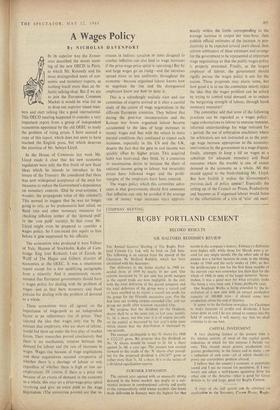A Wages Policy
By NICHOLAS DAVENPORT copy of this report, which does not seem to have reached the English press, but which deserves the attention of Mr. Selwyn Lloyd.
In the House of Commons last week Mr. Lloyd made it clear that his new economic regulators were only the first fruits of new fiscal ideas which he intends to introduce in his tenure of the Treasury. He considered that there was now widespread acceptance of the need for measures to reduce the Government's dependence on monetary controls. (Did he over-estimate, I wonder, the propaganda value of this column?) This seemed to suggest that he was no longer going to rely, as his predecessors had relied, on Bank rate and other monetary measures for checking inflation (either of the 'demand pull' or the 'cost puih' variety). In that event Mr. Lloyd might even be prepared to consider a wages policy. So I con mend this report to him before it gets suppressed by his officials.
The economists who produced it were Feltner of Yale, Hansen of Stockholm, Kahn of Cam- bridge, Eng. (our Richard), Lutz of Zurich, de Wolff of The Hague and Gilbert, director of economics at the OEEC. It was a unanimous report except for a few qualifying paragraphs from a minority. And it unanimously recom- mended that European governments should have a wages policy for dealing with the problem of wages—just as they have monetary and fiscal policies for dealing with the problem of demand as a whole.
These economists were all agreed on the importance of wage-push as an independent factor in an inflationary rise of prices. They rejected the idea that wages only rise by the amount that employers, who are short of labour, would bid them up under the free play of market forces. Their researches proved conclusively that there is no mechanistic relation between the demand for labour and the rate of increases in wages Wages rise because of wage negotiations and these negotiations succeed irrespective of whether there is a shortage of labour or not, regardless of whether there is high or low un- employment. Of course, if there is a price rise because of an excess of demand in the economy as a whole, this may set a price-wage-price spiral revolving and give an extra push to the wage negotiation. (The committee pointed out that in- creases in indirect taxation or rents designed to combat inflation can also lead to wage increases if the price-wage-price spiral is operating.) But by and large wages go on rising—and the increases spread more or less uniformly throughout the economy—because organised labour knows how to negotiate the rise and the disorganised employers know not how to deny it.
This is a refreshingly realistic view and our committee of experts arrived at it after a careful study of the course of wage negotiations in the different -European countries. They believe that during the post-war reconstruction and the Korean war boom organised labour became accustomed to the idea of large increases in money wages and that with the return to more normal conditions they continued to expect such increases, especially in the US and the UK, despite the fact that the gain in real income was quickly offset by higher prices. This acquired habit was motivated, they think, by a conscious or unconscious desire to increase the share of national income going to labour, but invariably prices have followed wages and the profit- margins of the employers have been restored.
The wages policy which this committee advo- cates is that governments should first announce that inflation can only be avoided if the average tate of money wage increases stays approXi- mately within the limits corresponding to the average increase in output per man-hour, then publish official estimates of the increase in pro- ductivity to be expected several years ahead, then inform arbitrators of these estimates and arrange for the government to be represented at important wage negotiations so that the public wages-policy is properly presented. Finally, as the largest employer of labour, the government should rigidly pursue the wages policy it sets for the nation. These proposals may alarm some, but how good it is to see the committee utterly reject the idea that the wages problem can be solved by trying to control total demand, or to reduce the bargaining strength of labour, through harsh monetary measures!
The committee add that none of the following practices can be regarded as a wages policy: vague exhortations to labour to exercise restraint, informal understandings for wage restraint for a period, the use of arbitration machinery where the arbitrators are not instructed as to the aver- age wage increase appropriate to the economy, intervention by the government in a wage dispute, finally, attempts to keep a lid on wages as a substitute for adequate monetary and fiscal measures where the trouble is one of excess demand in the economy as a whole. All this should appeal to the fresh-thinking Mr. Lloyd. But how foolish it makes the Government's previous ,lack of policy appear! Especially the setting up of the Council on Prices. Productivity and Incpmes as if organised labour would listen to the exhortations of a trio of 'wise' old men!






































 Previous page
Previous page